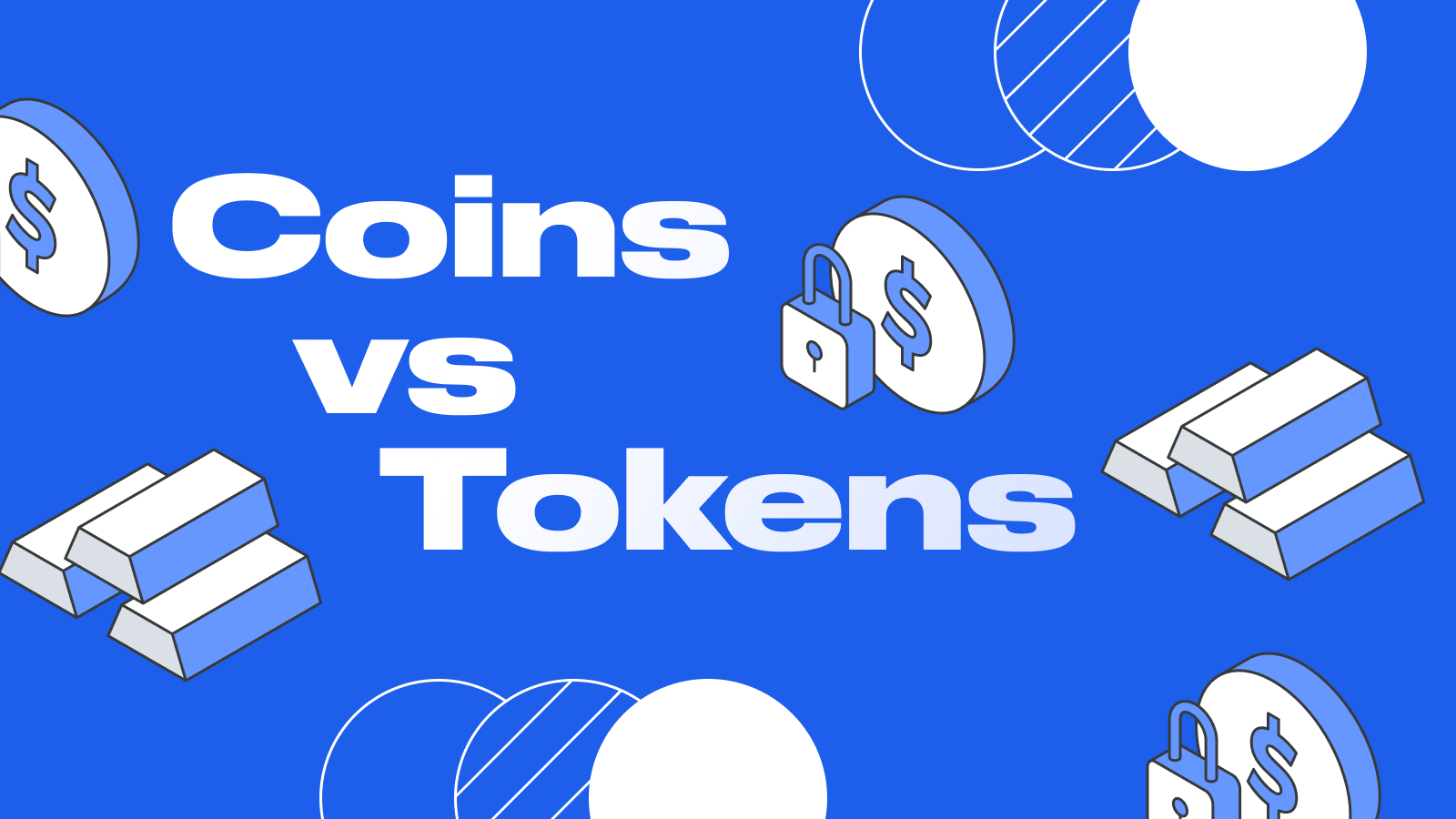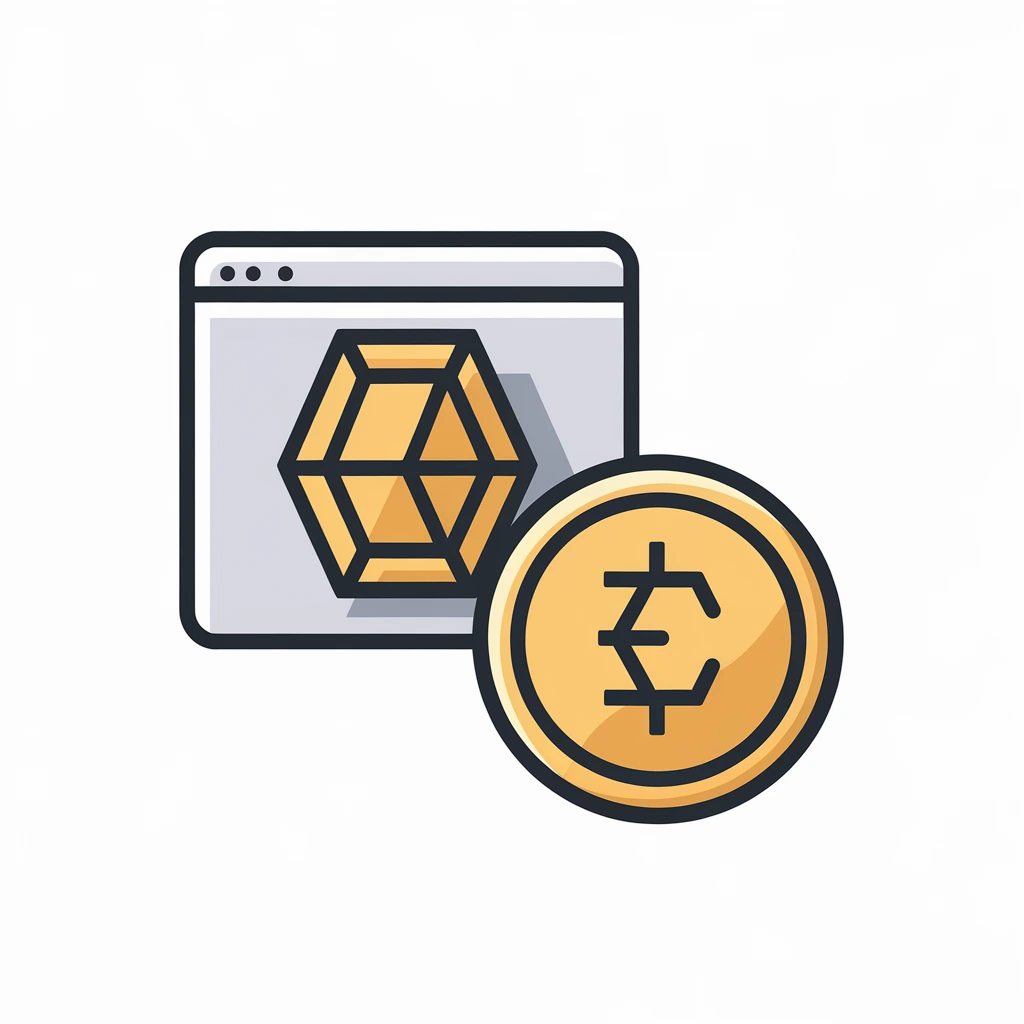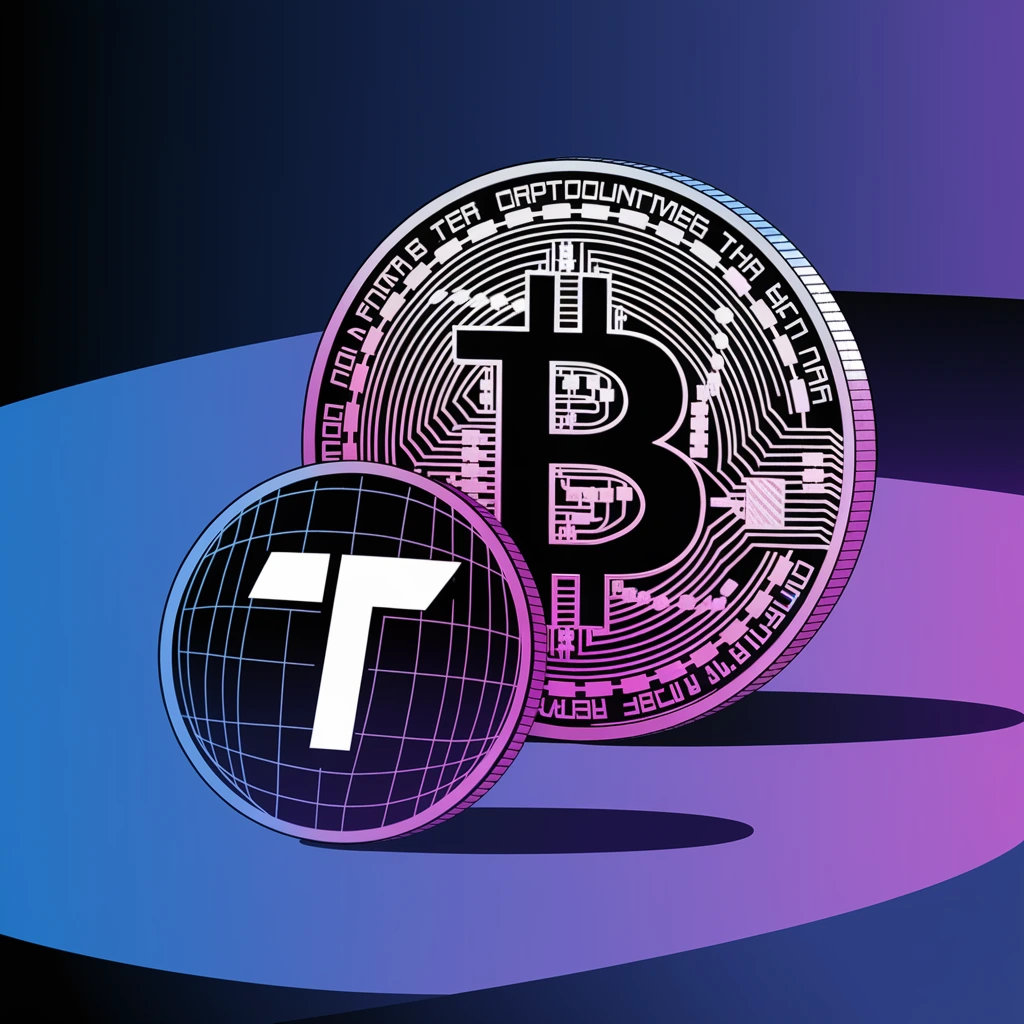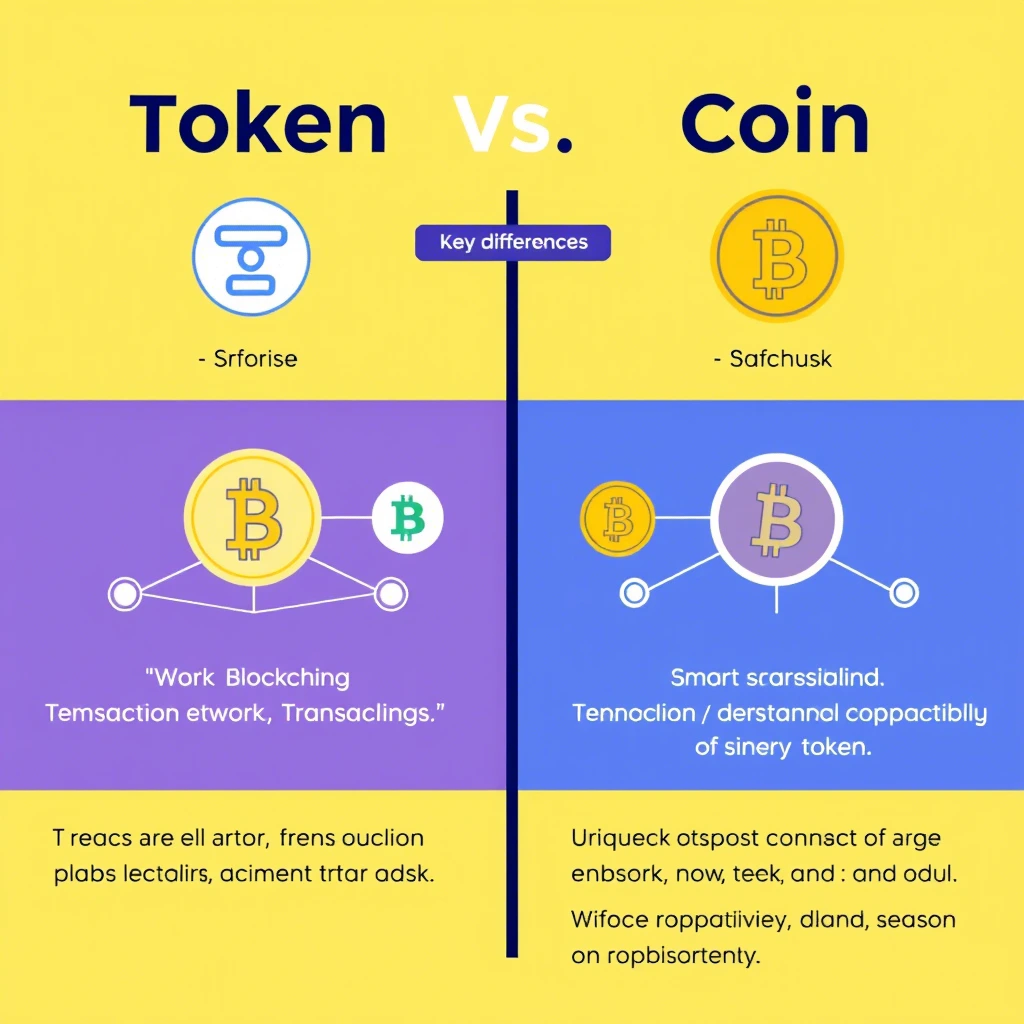Crypto Coins vs Tokens: Complete Comparison Guide

Digital assets: token and Coin - what is the difference?
The crypto world, like any other sphere, has an extensive specific vocabulary. Ignorance of this terminology can make it difficult to understand how everything works in the crypto market, which entails certain problems in understanding the processes.
Often a newcomer, who is just starting his or her journey in the crypto industry, wonders: what is the difference between a Coin and a token? Many, due to lack of knowledge, confuse these concepts, considering them synonyms. In this article, we will analyze each term separately and demonstrate what significant differences exist between them.

Coin
A Coin is an asset or coin that functions on a blockchain. Some of the most popular and recognizable Coins include Bitcoin, Ethereum, and Solana. Each exists on its own blockchain named after the coin. Within the network, users can transfer coins to each other, but physical exchange is not possible. A coin is expressed as a digital code that moves around the network of its blockchain.
Varieties
According to the analytical service CoinMarketCap, there are currently more than 11 million cryptocurrencies that combine coins, tokens and altcoins. However, it should be taken into account that not all cryptocurrencies are presented in the rating, but only those that the service considered suitable.
It is often mistakenly believed that altcoins are all digital currencies that are not bitcoin, but this misconception is so ingrained that many people accept it as truth. In reality, the term “altcoin” has a narrower meaning: it refers to coins whose blockchain is based on bitcoin. Some of the best known altcoins include Dogecoin and Litecoin.
Digital coins that have their own, independent blockchain can be called self-sustaining. Bitcoin, Ethereum, and Monero belong to this type of cryptocurrency.
Usage
Coins often serve as a payment system. Their use as such is as follows:
-
Cross-border transfers. Paying for something with coins is fast and profitable, which is the main advantage of crypto over traditional payment systems;
-
In some states, cryptocurrency is used to pay for goods and services. For example - El Salvador, where since 2021 bitcoin is the official means of payment;
-
Cryptocurrency is a great tool for trading. You can use it as you wish: for trading or for investment. Cryptocurrency is chosen for the fact that you can make money on it much faster compared to traditional assets. However, it requires some knowledge, otherwise you will also quickly suffer losses.
Bitcoin embodies all of the above characteristics. However, its scope is limited as it is the first cryptocurrency. Today, bitcoin acts more as an investment asset rather than a payment system, although the original idea was just that.
Therefore, other cryptocurrencies are already realizing different opportunities:
-
Ethereum, denoted by the abbreviation ETH, holds the second position in terms of market capitalization after Bitcoin. Its key difference lies in smart contracts, which are applications embedded in the blockchain that act as a digital contract. To illustrate how smart contracts work, we can use the example of loans: a borrower can get money from a lender by providing a digital asset as collateral. If the debt is paid on time, the smart contract automatically completes the transaction, returning the asset to the borrower. If the debt is not repaid, the lender takes possession of the digital asset. It is important to understand that the original provisions of the smart contract are unchangeable and cannot be adjusted, so the parties will need to fulfill all previously agreed terms. The use of such functionality avoids the human factor and intermediaries;
-
NEO is an ecosystem where users receive dividends for storing cryptocurrencies in their wallets. These dividends can be used to pay commissions on transfers within the network. In addition, you can create your own tokens on NEO. The current return on such investments is about 5% per year. At the same time, the holder of NEO can withdraw coins at any time;
-
Owners of Dash cryptocurrency have the opportunity to actively participate in the development of the project. Within the network there is a voting mechanism available to each coin holder, which allows him to influence key decisions and the direction of Dash development. This approach is implemented in many coins today, but Dash has become a pioneer in this.
Token
A token can be compared to a coin that is generated on a blockchain network. Ethereum is the leading platform for issuing tokens, so they are most often ERC-20 compliant. Although there are other platforms that allow the creation of tokens, such tokens such as Tron, Solana, and Cardano.
Almost anyone with some knowledge of cryptocurrencies will be able to create their own token, as long as their project operates in an appropriate ecosystem. This will require cryptocurrency, which will be used to pay the labor of the miners responsible for confirming the creation of the token. Further, a fee will be charged for each transaction on the network.
Consequently, we can conclude that tokens can be issued on the basis of any blockchain of interest, but you will have to pay commissions for its creation and further commissions. On the other hand, it will still be more expensive to create your own blockchain, on which the coin will function, so the use of an already ready-made blockchain opens up many opportunities for startups and new projects.
A few reasons why it is more profitable to use a token than a coin:
-
Blockchain provides a platform for creating a multitude of projects that offer a wide range of services. These projects can reach a mass of users and collect vast amounts of information. This opens up the possibility of creating a vast knowledge base on the blockchain, where information will not only be inaccessible to deletion, but also to any changes;
-
Thanks to the vast possibilities offered by decentralized applications, the implementation of any project becomes a reality, and at a relatively low cost;
-
Communication between users and creators takes place within the same network, which reduces risks (e.g. hacker attacks) and increases the efficiency of the services provided.
Varieties
Four main types of tokens can be distinguished:
-
A token is tied to a real commodity, such as USDT, which is equivalent to one American dollar, or PAXG, which is tied to gold;
-
There are also investor tokens, which can be compared to growth stocks in traditional markets. Purchasing a token at the initial stage of an investment implies the hope of future growth. These are the kind of tokens that were very popular during the ICOs of 2017-2018. For example, a new project may announce a closed funding round in order to raise funds for development, and investors could be the first to purchase the token, hoping for its growth in the future;
-
A token, like a coin, can serve as a means of payment for goods and services. But it would be more correct to specify that in 2025 to pay for anything stablecoins tied to the US dollar are used, for example: USDT, USDC, DAI;
-
Service tokens can be compared to a pass that gives access to various functions of platforms. They are created to perform technical tasks and have no monetary value and cannot be counterfeited.

Uses
Tokens find application in a wide range of fields. Let us consider the most promising of them:
-
A large number of different tokens can be used in decentralized applications. Among them, financial, partially financial and non-financial tokens are distinguished;
-
Tokens can represent the embodiment of real objects from the everyday world. NFTs (non-fungible tokens) are not as popular today as they were a few years ago, but they can still be used to digitally express a physical object;
-
Some native tokens are establishing partnerships with service companies. One example is Civic. If you plan to travel with an airline that works with Civic and you own a CVC coin, you can securely transmit your contact information to the airline in the form of a QR code. This code will contain all the information you need, making the check-in process much faster.
Key differences between a token and a coin

To summarize
Now you know the difference between tokens and coins, which will make it easier to choose investments and the right company. It is important to remember that tokens are not inferior to coins in terms of their capabilities. Creating your own blockchain is an expensive endeavor. Our onchain services support 5 blockchains and all tokens created in them. Therefore, you can analyze the wallets of market makers, holders and celebrities using ArbitrageScanner tools. Thanks to the already existing multi-functional networks, the cryptocurrency industry has seen many projects that without ready-made solutions would not have been able to launch due to financial constraints.
Want to learn more about crypto arbitrage?
Get a subscription and access the best tool on the market for arbitrage on Spot, Futures, CEX, and DEX exchanges.




